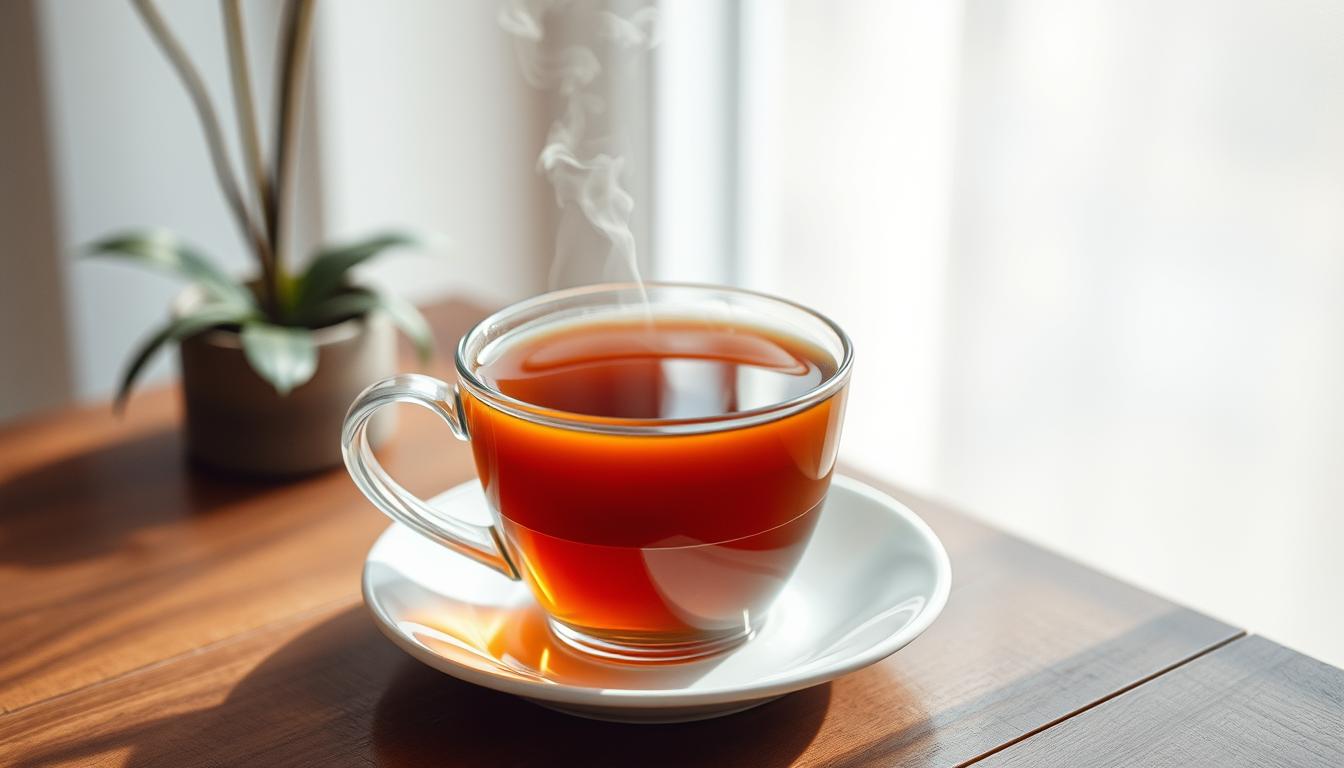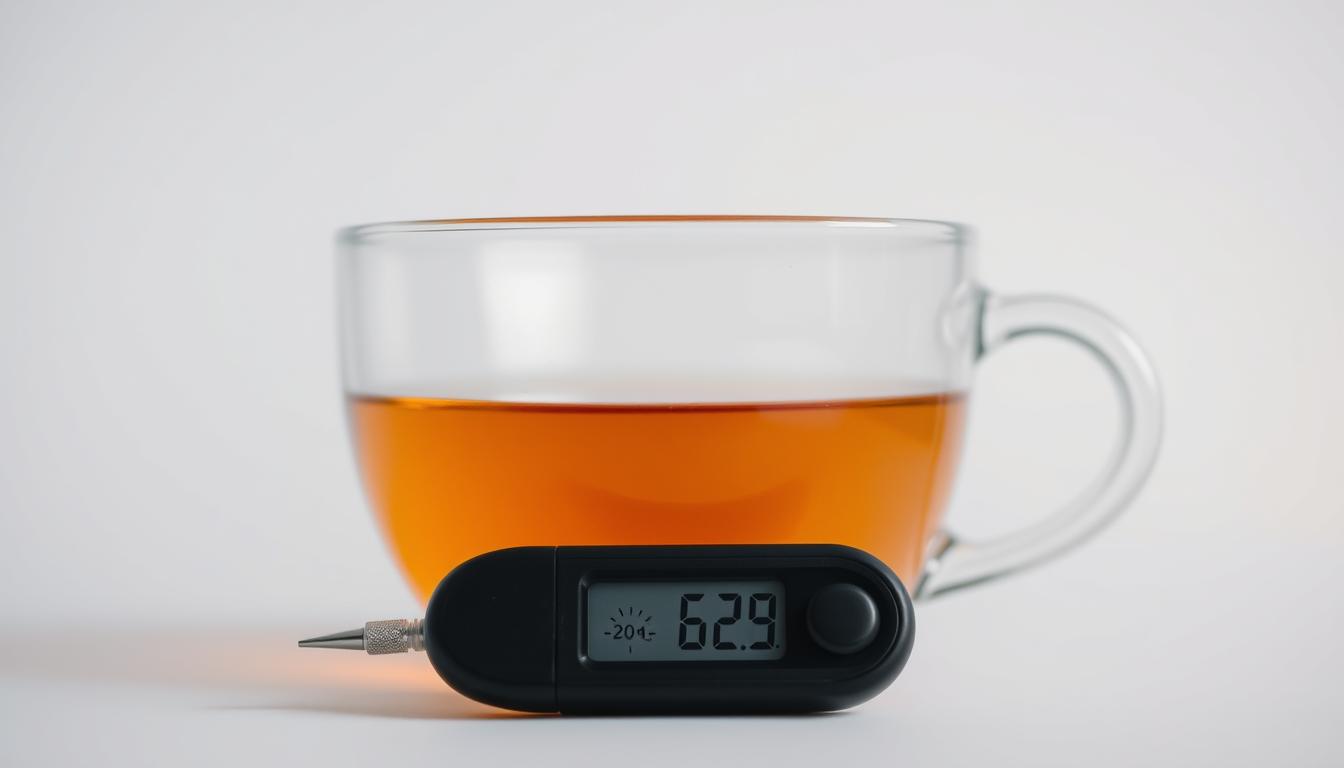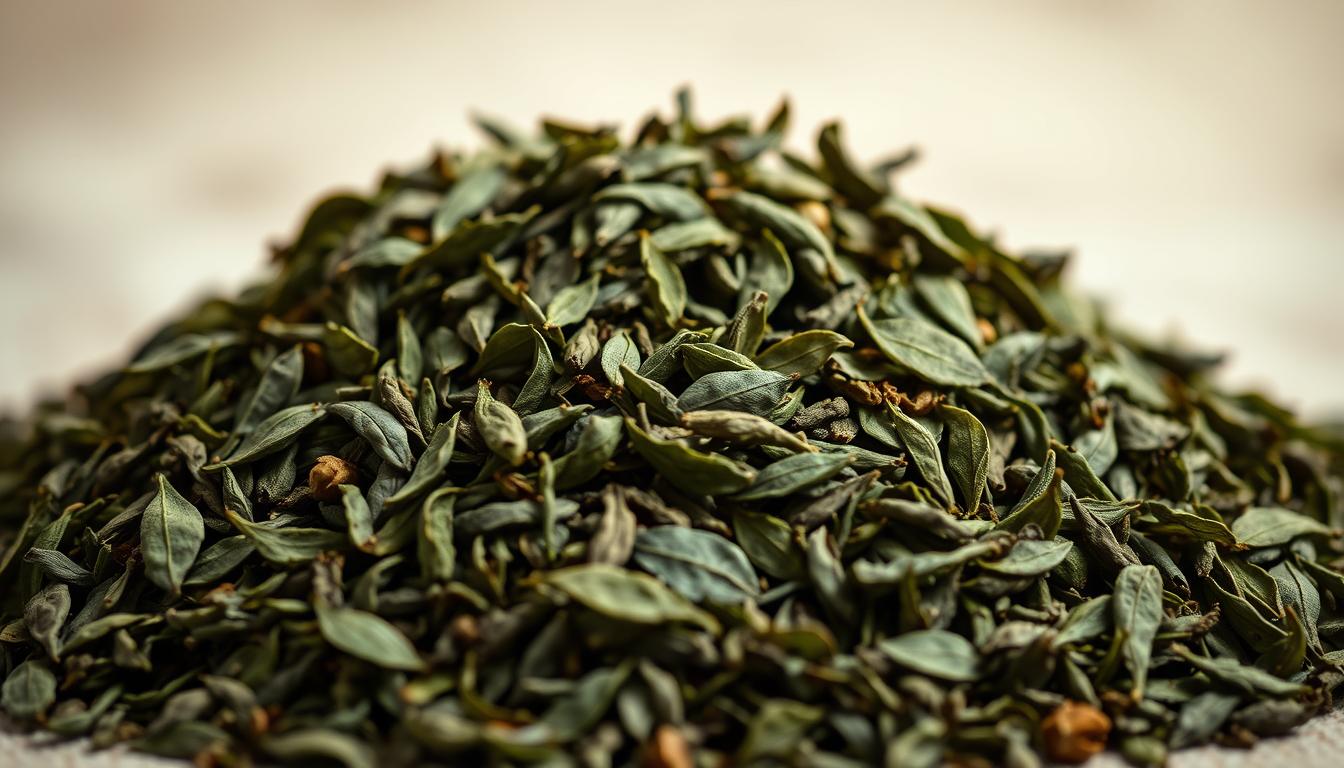Did you know that even decaf tea can contain trace amounts of caffeine? While many assume it’s completely caffeine-free, the truth is that the decaffeination process removes most, but not all, of the stimulant. This makes it a great option for those looking to reduce their intake without cutting it out entirely.
Decaf varieties like black tea, green tea, and oolong tea start as regular tea leaves. Through methods like carbon dioxide processing or water extraction, most of the caffeine is removed. However, a small amount often remains, which can vary depending on the process used.
For individuals sensitive to caffeine or those who want to avoid its effects, such as jitters or insomnia, decaf tea is a popular choice. It offers the familiar taste and benefits of tea without the high caffeine content. Stay tuned as we dive deeper into the decaffeination process and its health benefits in the sections ahead.
Key Takeaways
- Decaf tea is not entirely caffeine-free; trace amounts may remain.
- The decaffeination process removes most caffeine from tea leaves.
- Common decaf varieties include black tea, green tea, and oolong tea.
- The caffeine level in decaf tea depends on the decaffeination method used.
- Decaf tea is ideal for those sensitive to caffeine or looking to avoid its effects.
Introduction to Decaf Tea and Caffeine Myths
Decaf tea is often misunderstood, with many believing it’s entirely caffeine-free. While the decaffeination process removes most of the stimulant, trace amounts can still remain. This makes it a great option for those looking to reduce their intake without giving up the flavor and health benefits of their favorite beverage.

Overview of Decaffeination
The decaffeination process aims to remove caffeine while preserving the flavor and nutrients of the tea leaves. Common methods include the carbon dioxide method and water processing. The carbon dioxide method uses pressurized CO2 to extract caffeine, while water processing relies on soaking the leaves in water to dissolve the stimulant. Each method leaves a small amount of caffeine, which can vary depending on the technique used.
Common Misconceptions About Caffeine Content
One of the biggest myths is that decaf tea is completely caffeine-free. In reality, a cup of decaf tea may still contain a small amount of caffeine. This is important for individuals who are sensitive to caffeine or consume it before bedtime. Despite this, decaf tea remains a popular choice for its familiar taste and potential health benefits, such as antioxidants and polyphenols.
Whether you’re enjoying a cup of green tea or another variety, decaf options allow you to savor the experience without the jitters. Stay tuned as we explore the specific decaffeination processes in the next section.
does decaf tea have caffeine
The term ‘decaf’ can be misleading when it comes to tea. While most of the caffeine is removed during processing, trace amounts often remain. This means that decaf tea isn’t entirely free of the stimulant, which is important for those who are highly sensitive to its effects.

Understanding Trace Caffeine Levels
Decaffeination methods aim to remove as much caffeine as possible. However, they can’t eliminate it completely. On average, a cup of decaf tea contains about 2 milligrams of caffeine. While this is significantly lower than regular tea, it’s still enough to affect some individuals.
For those who are sensitive, even this small amount can cause mild effects. These might include restlessness or difficulty sleeping. However, for most people, the trace levels are unlikely to have a noticeable impact.
Decaf tea retains its flavor and health benefits despite the minimal caffeine. It’s packed with antioxidants and polyphenols, which support overall wellness. This makes it a great choice for those looking to reduce their caffeine intake without sacrificing taste or nutrition.
When compared to naturally caffeine-free herbal infusions, decaf tea still has a slight edge in terms of health benefits. Herbal teas, like chamomile or peppermint, are completely free of caffeine but may lack some of the nutrients found in traditional tea leaves.
| Beverage | Caffeine Content (per cup) |
|---|---|
| Decaf Tea | 2 mg |
| Herbal Infusion | 0 mg |
In summary, decaf tea is a fantastic option for reducing caffeine consumption. However, it’s important to note that it may not be entirely free of the stimulant. For those seeking a completely caffeine-free experience, herbal infusions are the way to go.
Health Implications of Decaf Tea vs. Regular Tea
Many people wonder how decaffeinated tea stacks up against its regular counterpart in terms of health benefits. While both options come from the same plant, the process to remove caffeine can impact their nutritional profiles. Understanding these differences can help you make an informed choice based on your health goals.
Comparative Antioxidant and Polyphenol Levels
Regular tea is known for its high levels of antioxidants and polyphenols, which support overall wellness. However, studies show that decaffeinated tea may have slightly reduced amounts of these compounds. The process to remove caffeine can affect flavanol content, which is a key antioxidant.
Despite this, decaffeinated tea still retains many beneficial properties. For example, it remains a rich source of polyphenols, which can help combat oxidative stress. This makes it a great option for those looking to enjoy the health benefits of tea without the stimulant effects.
Effects on Sleep and Digestion
One of the main reasons people choose decaffeinated tea is its positive impact on sleep. Unlike regular tea, which can interfere with rest due to its caffeine content, decaf varieties are gentle on the system. This makes them ideal for evening consumption.
Additionally, decaf tea can aid digestion. Its soothing properties can help calm the stomach, making it a popular choice after meals. For individuals sensitive to caffeine, this is a significant advantage.
| Aspect | Decaf Tea | Regular Tea |
|---|---|---|
| Antioxidant Levels | Slightly Reduced | High |
| Polyphenol Content | Moderate | High |
| Effect on Sleep | Positive | Negative |
| Digestive Benefits | Calming | Mild |
In summary, while decaffeinated tea may have slightly fewer antioxidants compared to regular tea, it still offers significant health benefits. Its positive effects on sleep and digestion make it a valuable addition to your daily routine.
Benefits and Drawbacks of Choosing Decaf Tea
Exploring the pros and cons of decaf tea helps you make an informed choice. This alternative offers flexibility for those who want to enjoy their favorite beverage without the side effects of caffeine. However, it’s essential to weigh the advantages against potential drawbacks.
Advantages: Flexibility and Reduced Jitters
One of the biggest benefits of decaf tea is its versatility. You can enjoy a cup at any time without worrying about jitters or sleep disturbances. This makes it an excellent choice for individuals with caffeine sensitivity or those who prefer a calming drink in the evening.
Another advantage is the reduced caffeine content. While trace amounts may remain, the levels are low enough to avoid common side effects. This allows you to savor the flavor and health benefits of tea without the stimulant’s impact.
Considerations: Altered Flavor and Health Trade-offs
Despite its benefits, decaf tea may have some drawbacks. The decaffeination process can alter the flavor profile of certain types, such as white tea or green tea. Some drinkers notice a subtle difference in taste compared to the original version.
Additionally, there may be health trade-offs. The process of removing caffeine can reduce the levels of antioxidants and polyphenols. While decaf tea still offers nutritional value, it may not match the full benefits of regular tea.
| Aspect | Benefits | Drawbacks |
|---|---|---|
| Flexibility | Can be enjoyed any time | Altered flavor in some types |
| Health Impact | Reduced jitters | Lower antioxidant levels |
| Caffeine Content | Minimal stimulant effects | Trace amounts may remain |
When choosing decaf tea, consider your personal preferences and health priorities. Whether you prioritize flavor or flexibility, this alternative offers a balanced option for tea lovers.
Exploring Naturally Caffeine-Free Alternatives
Looking for a caffeine-free option? Herbal teas are a natural choice. Unlike decaffeinated varieties, these infusions are naturally free of caffeine, making them ideal for those who want to avoid the stimulant entirely. From rooibos to chamomile, herbal teas offer a wide range of flavors and health benefits.
Herbal Teas Versus Decaffeinated Varieties
Herbal teas, also known as tisanes, are made from plants, flowers, and herbs. They never contain caffeine, unlike decaffeinated teas, which start as true tea leaves. This makes herbal options perfect for evening consumption or for those with caffeine sensitivity.
When it comes to taste, herbal teas shine with their unique profiles. For example, rooibos offers a sweet, nutty flavor, while peppermint provides a refreshing, minty kick. Decaffeinated teas, such as oolong or decaf black, retain their original flavors but may lose some depth during processing.
Health benefits also vary. Herbal teas like chamomile are known for their calming properties, while rooibos is rich in antioxidants. Decaffeinated teas still offer some benefits, but the process to remove caffeine can reduce nutrient levels.
According to a study, herbal teas can provide similar health benefits to traditional teas without the caffeine. This makes them a great alternative for those seeking wellness without the stimulant effects.
When choosing between herbal and decaffeinated teas, consider your preferences. If you prioritize a completely caffeine-free experience, herbal teas are the way to go. For those who enjoy the taste of traditional teas but want less caffeine, decaffeinated varieties are a solid choice.
Conclusion
Choosing the right beverage can be a simple yet impactful decision for your daily routine. Throughout this article, we’ve explored how trace amounts of caffeine may remain in decaf varieties, despite the decaffeination process. Methods like carbon dioxide extraction or water processing remove most of the stimulant but can slightly alter flavor and nutrient levels.
When comparing decaf to naturally caffeine-free tisanes, each option has its pros and cons. Decaf retains some health benefits and familiar tastes, while tisanes offer unique flavors and zero caffeine. The final choice depends on your health needs, taste preferences, and lifestyle.
Whether you prefer a soothing tisane or a decaf product, selecting the right thing for you is key. Explore reputable brands and experiment to find what aligns with your priorities. Your perfect cup is out there—happy sipping!

